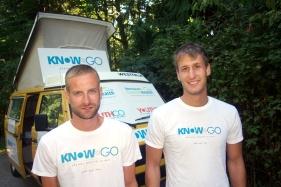YouthCO and Vancouver Coastal Health (VCH) want to increase access to HIV and STI testing through their new mobile sexual health clinic, Know on the Go.
The pilot project launched at Pride with testing at the Sunset Beach festival.
“This is the first time that we’ve really expanded outreach mobile health services in this manner to provide HIV and STI testing,” says Geoffrey Ford, a nurse educator with VCH. “Outdoor venues, concerts, bars, all these types of things are future plans.”
The clinic, a 1982 Volkswagen Westfalia camper van, is run by YouthCO with support from VCH. It is staffed by a registered nurse who can perform full HIV, hep-C and STI testing, as well as YouthCO staff and volunteers who provide outreach and information.
“We hope to Increase access to gay men and men who are having sex with men,” Ford says.
“Let’s increase routine testing. Let’s make it easy, let’s make it normal, let’s make it easier to access.”
“Let’s also focus on populations where we need to increase levels of access and make it more accessible,” he adds. “This project is to see if outreach testing works, but with a focus on gay men and men who have sex with men.”
Since Pride the van has brought at least 10 clinics to areas frequented by men who have sex with men, including Wreck Beach and Stanley Park.
“If you go into an STI clinic downtown it’s the same type of thing,” Ford points out. “There are STI-certified nurses — they have a specialty in this type of work. We can do referrals to community services, so if somebody doesn’t have a doctor we can link them up with the appropriate care provider. There’s harm-reduction supplies available, and we’ve got condoms and lubricants and all that type of stuff.”
Darijan Bodi, YouthCO’s HIV support and vommunity projects coordinator, hopes the mobile clinic will normalize routine testing by making the services more visible throughout the community.
“A lot of people don’t have the time. They plan on getting tested and going to doctors, and something comes up or they forget or just don’t make time for it,” Bodi says. “So we just kind of drop in on the spot and say, ‘Do you want it right now?’ A lot of people respond to that. They don’t think about it on a day-to-day basis and then all of a sudden it’s brought to their face and they are like, ‘I have a few minutes, why not do it right now?’”
Ford hopes the clinic can reach men who may not otherwise access gay men’s health services.
“For services available on Davie St, there are some guys who aren’t going to go there for a number of reasons,” Ford says. “Some do not feel comfortable in that environment, and there are men who have sex with men who don’t identify as gay. It really tries to make it easier for people who may not go and get that next step and go to the clinic. Let’s make it a bit easier and try and bring it as close to you as possible. It’s always someone’s choice, but it makes it really easy for people to access care.”
Ford says the new clinic has received a very positive response from clients and passersby. He notes that many men have expressed interest in non-occupational post-exposure prophylaxis (nPEP), which is a drug therapy that can prevent someone from becoming HIV-positive after exposure to the virus.
“There’s been a lot of talk in the community about it, and this has been a great chance to try to not just provide direct health services but also general information,” he says. “A lot of guys don’t know where to go, so we’ve got some information on the Health Initiative for Men clinic. If they’re on the beach they don’t want to do it now, but we can at least give them information about where else they can go in the community to get services.”
After the Know on the Go pilot project wraps up in early October, VCH will evaluate it to determine whether to make it a permanent program.
“I’d like to see sustained funding for these types of projects in the gay community,” Ford says. “It’s a great way to bring healthcare to a community that needs it, particularly when you’re talking about HIV. We continue to see rates stabilize or rise within the gay community specifically. I think that it makes it very clear that we’re not doing enough to reach this community and provide both education and testing and referrals into care. Whatever that care looks like, it’s never a bad idea.”

 Why you can trust Xtra
Why you can trust Xtra


